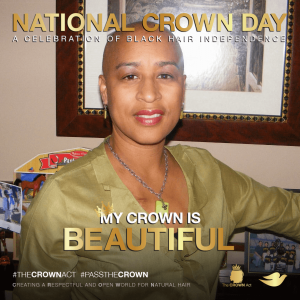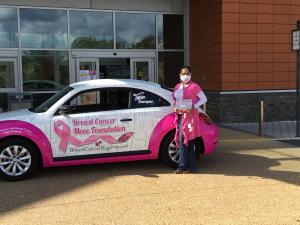Let’s Talk About It: Breast Cancer Disparities in African American Women and Environmental Factors Affecting Veterans
Time to Speak it: What's not being said is the number of women in the military diagnosed with breast cancer. Especially for us women of color exposed to toxins.
As someone who has survived breast cancer not once but twice, I have experienced first-hand the disparities that exist for African American women and why early detection makes all the difference. Breast cancer is the most diagnosed cancer worldwide and is one of the most common causes of cancer-related death in women. [1] However, that is where the global similarities end. When it comes to treatment and outcomes, race-related differences are astounding.
Over the past three decades, the overall survival rate of those diagnosed with breast cancer has steadily risen. Breast cancer survival can be attributed to earlier detection, advances in targeted treatment, and access to care. This progress is terrific but not equally shared amongst all women. [1] This is evident when race and ethnicity are some of the strongest predictors of cancer mortality.
In the African American population, breast cancer has some unfavorable defining characteristics, including occurrence at an early age, more aggressive tumors, and less favorable outcomes. [2] While these are the qualities currently attributed to African American women with breast cancer, they are not entirely due to genetic predisposition. These qualities can be improved with equality in cancer screening, diagnosis, and treatment.
When it comes to cancer detection and diagnosis, I feel as though I can confidently say that everyone knows earlier is better. The earlier a cancer is detected; the sooner treatment can begin. Not only that, but the most significant part of detection is catching cancer before it has had a chance to metastasize, as this indicates a higher risk of mortality.
However, when looking at a summary of breast cancer stage distribution amongst Caucasians and African Americans, more Caucasians have their cancer diagnosed. At the same time, it is still defined as local. In contrast, African Americans are more likely to diagnose their cancer when categorized as regional or distant, more advanced stages. [1]
Treatment is yet another critical factor in breast cancer survival and one of the foundations for new and improved treatments in clinical trials. African American women are seven times more likely to die because of breast cancer when compared to Caucasian women, yet they are notoriously underrepresented in these trials. Accounting for only 1% to 3% of participants, this underrepresentation in clinical trials produces treatment safety and efficacy results that are severely lacking. [2]
Tanja is also a 25-year military veteran and feels that her breast cancer was environmentally related due to her military service. According to their GE Healthcare May 2020 article, the study was of breast cancer occurrences at Walter Reed Army Medical Center. The results were astonishing, “found military personnel to be nearly 40% more likely to develop breast cancer than non-military. The study even further says that environmental factors, such as exposure to burn pits, airborne toxins, chemical solvents, and mire. It may have been a contributing factor to the high number of breast cancer diagnoses among military women. According to the Department of Veterans (VA), it is estimated that 700 women veterans are diagnosed with breast cancer each year. [4]
Some may say that the reason why mortality in the African American community is the highest is that we are at a genetic predisposition to aggressive forms of cancer, and that is true. African American women are twice as likely to have triple-negative breast cancer [2], which has characteristics of earlier onset, a more advanced stage at diagnosis, and an aggressive tumor. [3] But the question then comes up, if African American women are more susceptible to aggressive forms of breast cancer, shouldn’t our early screening process be even more vigilant?
Breast cancer is one of the #1 leading causes of cancer-related death in women today. Advancements in early detection and treatment strategies have improved exponentially over the past few decades, but a significant group within the breast cancer community is still being overlooked. It is unethical and wrong for these disparities in detection and treatment to existing, especially in a population with a higher genetic predisposition towards a more aggressive and deadly form of breast cancer. As a 2x breast cancer thrive I've often felt alone in this fight and it’s about time that African American women receive the early detection and treatment they deserve.
Tanja Thompson helps to serve women of color and veterans with motivation, inspiration, and mental mindset strategies to move from the darkness of desire to the light of peace and joy. She does her non-profit The Breast Cancer Move Foundation a 501(c)3 charitable organization.
References
[1] Stringer-Reasor, E., Elkhanany, A., Khoury, K., Simon, M., & Newman, L. (2021). Disparities in Breast Cancer Associated With African American Identity | American Society of Clinical Oncology Educational Book. American Society Of Clinical Oncology Educational Book. Retrieved from https://ascopubs.org/doi/full/10.1200/EDBK_319929
[2] Gathirua-Mwangi, W., Monahan, P., Stump, T., Rawl, S., Skinner, C., & Champion, V. (2015). Mammography Adherence in African-American Women: Results of a Randomized Controlled Trial. Annals Of Behavioral Medicine, 50(1), 70-78. DOI: 10.1007/s12160-015-9733-0
[3] Siddharth, S., & Sharma, D. (2018). Racial Disparity and Triple-Negative Breast Cancer in African-American Women: A Multifaceted Affair between Obesity, Biology, and Socioeconomic Determinants. Cancers, 10(12), 514. DOI: 10.3390/cancers10120514
[4] https://www.gehealthcare.com/article/elevated-breast-health-concerns-for-servicewomen-and-women-veterans.
Tanja Thompson
Breast Cancer Move Foundation
+1 301-437-9491
breastcancerbugsme@gmail.com
Who is Tanja Thompson
Legal Disclaimer:
EIN Presswire provides this news content "as is" without warranty of any kind. We do not accept any responsibility or liability for the accuracy, content, images, videos, licenses, completeness, legality, or reliability of the information contained in this article. If you have any complaints or copyright issues related to this article, kindly contact the author above.



